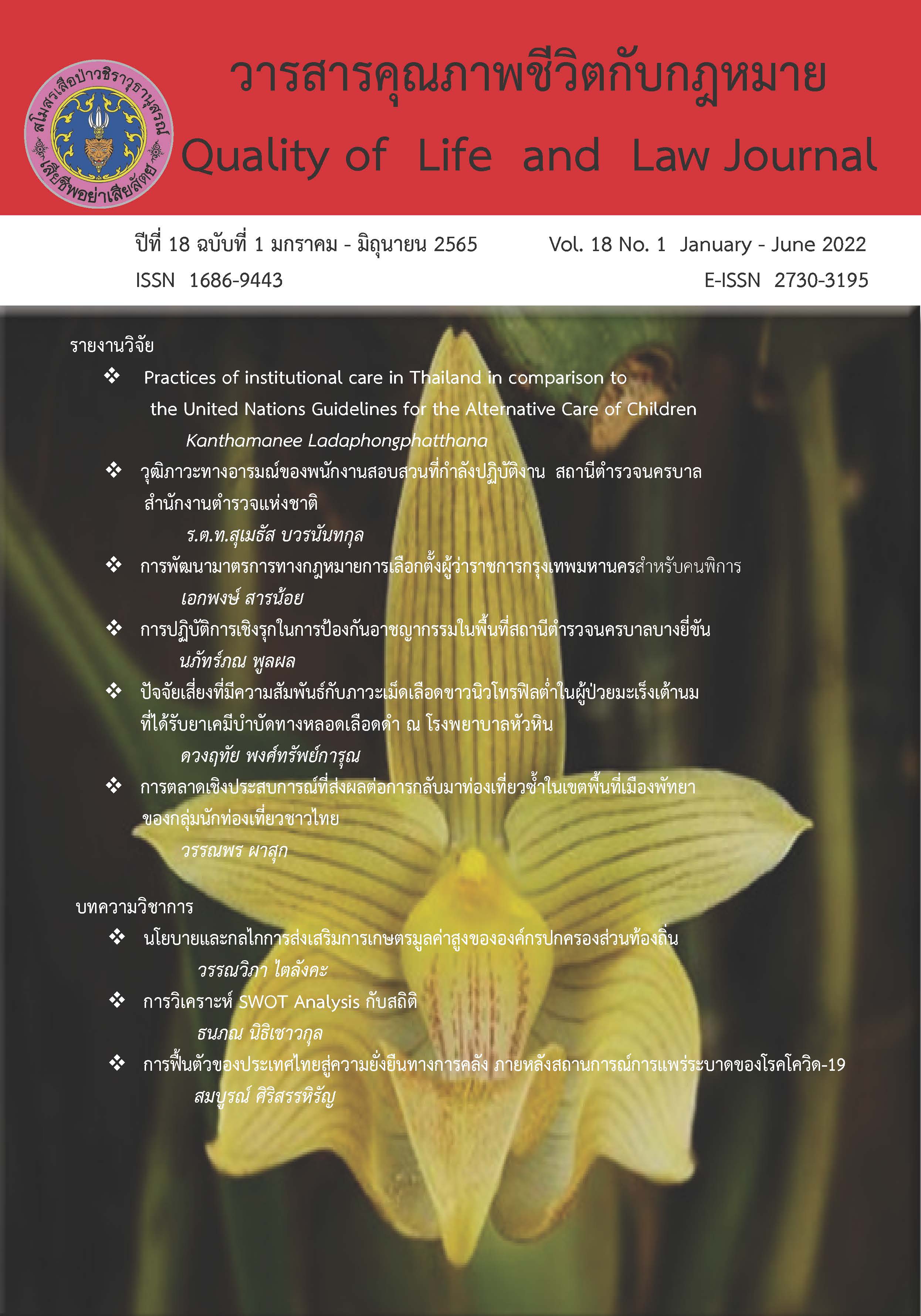EXPERIENTIAL MARKETING AFFECTING THAI TOURISM’S REVISITING PATTAYA, CHONBURI
Main Article Content
Abstract
The objective of this study was to examine factors that influence experiential marketing affecting Thai tourism’s revisiting Pattaya, by studying demographic characteristics, Sense Marketing, Feel Marketing, Think Marketing, Act Marketing, Relate Marketing, destination loyalty and destination revisiting. Data were collected from 248 Thai tourists who visited with tourism characteristics in the form of man-made tourist attraction. through a convenience sampling method, using self-administered questionnaires. This study employed descriptive statistics (percentage, mean, and S.D) and inferential statistics (path analysis) to analyze data. The Structural Equation Model (SEM) to find out which dimensions affecting tourist revisiting in case of Pattaya.
The results found that the motivation factors and the experiential marketing were important to the success of positive experiential marketing were highly correlated to the empirical data. From overall view of A Model of experiential marketing affecting Thai tourism’s revisiting Pattaya; the elements of the experience marketing were consisting of Sense Marketing, Feel Marketing, Think Marketing, Act Marketing, Relate Marketing; The success of the tourists’ attraction loyalty includes visiting repeating, recommend, willing to pay and the success of the Intention to revisiting includes intention, effort, and planning. Simultaneously, experiential marketing has positive impact of both direct and indirect on the tourists’ attraction loyalty and the Intention to revisiting.
Article Details

This work is licensed under a Creative Commons Attribution-NonCommercial-NoDerivatives 4.0 International License.
- บทความหรือข้อคิดเห็นใดๆ ในวารสารคุณภาพชีวิตกับกฎหมายเป็
- กองบรรณาธิการไม่สงวนสิทธิ์
References
กระทรวงการท่องเที่ยวและกีฬา. (2563). สถานการณ์การท่องเที่ยว เดือนพฤศจิกายน 2563. กองเศรษฐกิจการท่องเที่ยวและกีฬา 1-9.
ชัชชพันธ์ เล็กเจริญ. (2559). การตลาดเชิงประสบการณ์กับความภักดีของผู้บริโภคในการชมการแสดงทอล์คโชว์.งานนิพนธ์การศึกษาศิลปศาสตรมหาบัณฑิต,สาขานิเทศศาสตร์และนวัตกรรม, คณะนิเทศศาสตร์และนวัตกรรมการจัดการ, สถาบันบัณฑิตนบริหารศาสตร์.
ธัญวลัย หงษ์ทอง. (2560). กลยุทธ์การตลาดเชิงประสบการณ์ท่องเที่ยวที่ส่งผลต่อการตัดสินใจเลือกสถานที่ท่องเที่ยวของนักท่องเที่ยวชาวต่างชาติในจังหวัดเชียงใหม่.การค้นคว้าอิสระ บริหารธุรกิจมหาบัณฑิต, มหาวิทยาลัยกรุงเทพ.
เมืองพัทยา จังหวัดชลบุรี. (2563). พัทยา ไดเรคทอรี่ ชลบุรี: เมืองพัทยา.
วุฒิชาติ สุนทรสมัย. (2552). การวิจัยการตลาดและระบบสารสนเทศทางการตลาด. กรุงเทพมหานคร: สำนักพิมพ์ ส.ส.ท. สมาคมส่งเสริมเทคโนโลยี (ไทย-ญี่ปุ่น).
สำนักงานพัฒนาการท่องเที่ยว. (2562). โครงการสำรวจพฤติกรรมการเดินทางท่องเที่ยวภายในประเทศ. กระทรวงการท่องเที่ยวและกีฬา.
Ajzen, I., & Fishbein, M. (1980). Understanding attitudes and predicting social behavior. Englewood Cliffs, N.J.: Prentice-Hall.
Kotler, P., & Keller, K. L. (2009). Marketing Management (12th Edition ed.). Edinburgh Gate: Pearson Education Limited.
Oliver. (1997). Satisfaction: A behavioral perspective on the consumer. New York: McGraw Hill.
Robinson, S., & Etherington, L. (2006). Customer Loyalty: A Guide for Time Travelers. New York: Palgrave Macmillan.
Schmitt, B. H., & Rogers, D. L. (2008). Handbook on brand and experience management. UK: Edward Elgar Publishing Limited.


